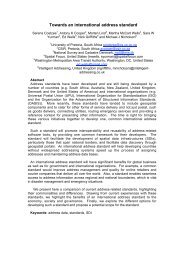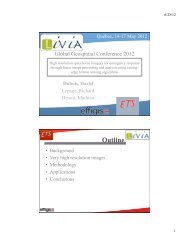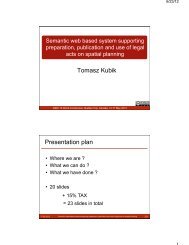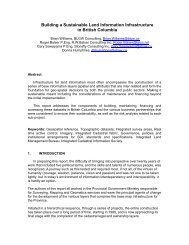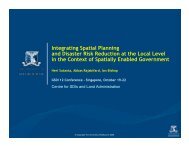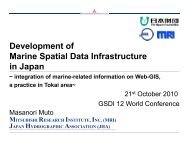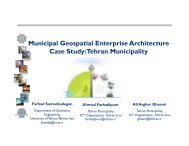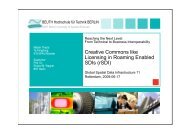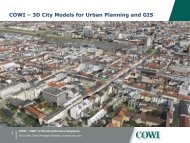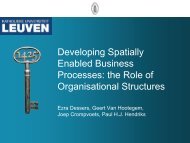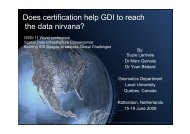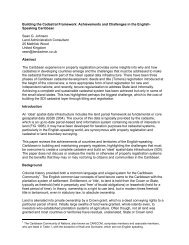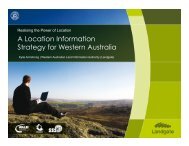SDI Convergence - Global Spatial Data Infrastructure Association
SDI Convergence - Global Spatial Data Infrastructure Association
SDI Convergence - Global Spatial Data Infrastructure Association
Create successful ePaper yourself
Turn your PDF publications into a flip-book with our unique Google optimized e-Paper software.
3. PHASE I: EUROPEAN CONTEXT AND ACTIVITIES ON USE AND REUSE OF<br />
GEOGRAPHIC INFORMATION<br />
In the first phase of the research the overall context related to the dissemination and<br />
reuse of digital information was considered, especially in the geographic information<br />
environment.<br />
3.1 Digital Rights Management (DRM) and its application in the geographic context<br />
(GeoDRM)<br />
Digital Rights Management (DRM) focuses on the protection of digital content: the term<br />
‘Digital’ refers to the protected resources, ‘Rights’ refers to the intellectual property<br />
rights linked to the resources and ‘Management’ applies to defining and enforcing a<br />
policy to respect these rights. In this way information owners and distributors can control<br />
type of access and use of digital contents.<br />
Geographic Digital Rights Management (GeoDRM) is the application of DRM in the<br />
geographic field, and it provides a framework to legislate the use of geographic information.<br />
The narrow definition of GeoDRM refers to “electronic licensing of geographic<br />
resources to manage and protect intellectual property rights” (Vowles, 2007). In the<br />
broad definition, GeoDRM can be taken to cover a large “spectrum of capabilities and<br />
underlying technologies supporting description, identification, trading, protecting monitoring<br />
and tracking of all forms of use rights for both tangible and intangible (electronic)<br />
assets, including the management of rights-holders relationships” (OGC, 2007).<br />
The GeoDRM application needs a set of technologies and a legal framework, where all<br />
rights over geographic resources are specified by the information owner, while information<br />
users obtain geo information under certified conditions by using an automated or<br />
semi-automated implemented geolicence. Piedmont Region founded its project exactly<br />
on this assumption.<br />
3.2 The leading role of Geographic Rights Management in the INSPIRE context<br />
The INSPIRE Directive recognises the importance of intellectual property rights for<br />
public authorities, using Geo Rights Management services (GeoRM), useful to specify<br />
electronically distribution policies. A Rights management service is a technology providing<br />
additional functionalities to control access, under specified conditions and policies.<br />
It represents a filter between the INSPIRE service bus and INSPIRE network services,<br />
as described in the draft Implementing Rules for Network Services (INSPIRE,<br />
2008).<br />
In the INSPIRE context, a service bus is a software bus that allows the connection of<br />
the geo-portals and their applications to other INSPIRE network services (discovery,<br />
view, download, transformation and invoke services). RM services include three different<br />
layers: authentication and authorisation, licensing and eCommerce. GeoRM supports<br />
the automated transfer of legal rights to final users using electronic licences<br />
specifying terms and conditions. The traditional method to protect static content is<br />
copyright, using paper-based licences. The Creative Commons concept introduces<br />
standard electronic licences for static content for reuse of their intellectual property<br />
(Welle Donker and Van Loenen, 2006). GeoRM introduces a different way of managing<br />
and protecting intellectual property rights, using electronic licences for dynamic content.<br />
The regional project is going to follow this approach, to realise ‘click-licences’ for<br />
its geographic information.<br />
55



